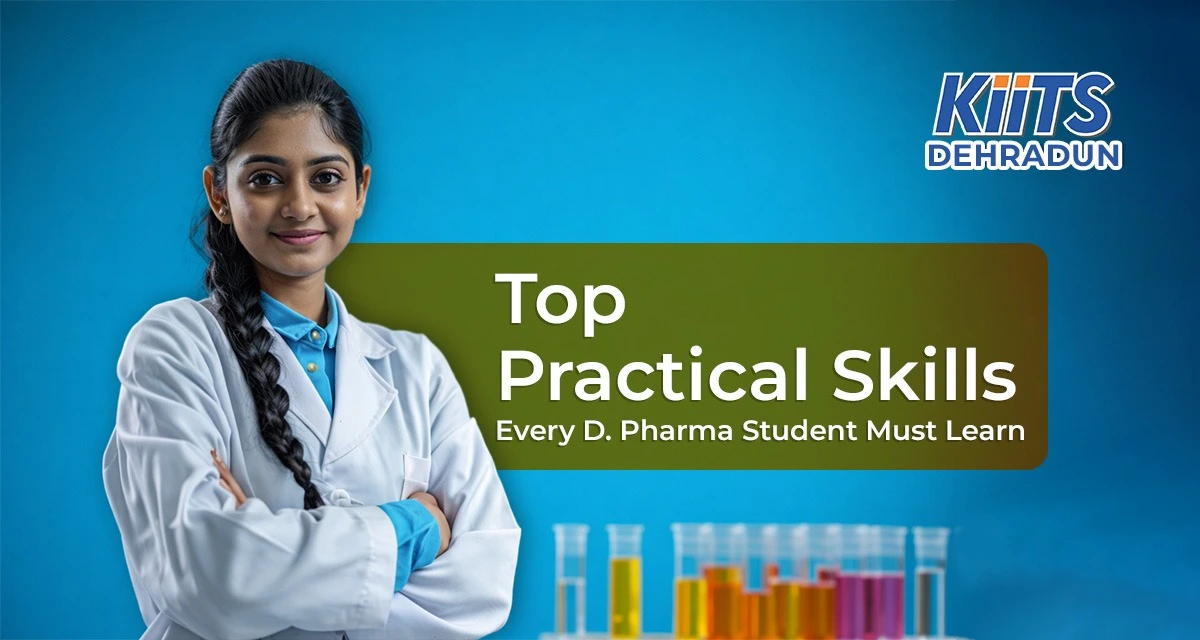Pharmacy is perhaps one of the most primitive yet progressive fields that exist today. It connects the science of medicine with the operational aspects of taking care of patients as medicines designed to save lives are created, produced, and made to work. the Bachelor of Pharmacy (B. Pharm Course) prepares students with theoretical and practical knowledge needed to excel in the field of healthcare and pharmacy.
The subjects include pharmaceutical chemistry, pharmacology, pharmaceutics as well as pharmacognosy. There are also concepts and principles instructing for controlling drug quality, and systems and procedures aimed for regulatory compliance and drug counseling. The course is designed with both theory and practice and prepares students for a career in the pharmaceutical industry for research and development or clinical practice.
Further in this article, we are going to study the details on the structure and the breadth of study offered by the B. Pharm Course, including the scope of employment in the pharma industry as well the future and scope of Pharmacy .
What is B.Pharm Course?
A B.Pharm Course or Bachelors of Pharmacy is a 4-year undergraduate degree course which aims to provide a conceptual understanding of medicines, drugs, their formulations and applications. Major topics addressed in the course include medicinal chemistry, pharmaceutics and pharmaceutical analysis. Individuals with a B. Pharm degrees are eligible to practice as pharmacists, researchers and work in the pharmaceutical, healthcare, and other industries. After the B Pharm degree students can also opt for higher studies in M. Pharma or PhD.
Course Duration – Four years
Eligibility: The eligibility requirement for both degree courses is similar. In order to gain admission, students must have completed their Advanced Level Studies with compulsory subjects: Physics, Chemistry, Biology/Mathematics.
Core Subjects: Human anatomy, physiology, industrial pharmacy, and microbiology
Career Options after B.Pharm Course:
After completing your B.Pharm Degree, individuals have opportunities to experience various fields as a Drug Inspector, Research Associate, and Clinical Pharmacists.
There are various career options in the Pharmaceutical field and after completing the B.Pharm Course individuals are introduced in various fields. Here are some reasons listed below to why to choose B.Pharm as a career path:
The Role of Pharmacists in Healthcare
Pharmacists participate in the health care team and provide essential services that go beyond the conventional roles of dispensing medicines and ensuring patient safety. Emerging roles of pharmacists involve leading health education programs. These develop materials and initiatives to inform the public about health conditions, promote wellness, and encourage outcomes. Pharmacist-led health education programs use pharmacists’ unique qualifications to fill unmet needs for knowledge in health care and to make available appropriate health information to communities. This paper is an attempt to discuss pharmacist-led health education programs, their impacts, potential benefits, and approaches toward implementation.
Why Choose B Pharm as a Career Path:
B.Pharm holders can pursue any career they wish. There are numerous clinical and commercial career options such as working for research and development departments in pharmaceutical companies, serving as clinical pharmacists in hospitals, or owning a pharmacy. Many opportunities exist from regulatory affairs, quality assurance, and even drug production.
Various Opportunities: This branch of pharmacy adequately reflects the myriad career paths and opportunities that are obtainable.
There are positions that can be taken up with pharmaceutical companies, research labs, clinics and even starting a pharmacy of one’s own. This field is further diversified with positions in drug regulatory affairs, quality control, and drug manufacturing.
Impact on Healthcare : Pharmacists also ensure that patients use the appropriate medications at the right time. Getting a B. Pharm degree places one in the center stage of healthcare systems and has the potential of greatly changing healthcare outcomes for the population at large. This level of pharmacy further illustrates how healthcare can be impacted.
Growing demand of Pharmacists : The increase of chronic diseases, an aging population, and new medicine requirements has shifted the focus to provision of qualified pharmacists. Also the pharmacy economy is one of the fastest emerging industries in the world and assures job opportunities as well as career growth. Last but not the least, it is worth mentioning that there is a growing need for pharmacists.
Skills Gained During B Pharma :
During the bachelor of Pharmacy program, students develop various skill sets that help them to excel in the healthcare industry. Some of them are listed below:
- Pharmaceutical Knowledge
Grasp at an advanced level of the structure of drugs and their chemistry, pharmacology, and how the chemicals are absorbed by the body. Familiarity with the processes of formulation and formulation of drugs, the setting up of manufacturing facilities, and the regulatory quality assurance systems.
- Analytical and Research Skills
Possesses the skills needed to vet intricate data and conclude scientific studies.
Competence in basic laboratory skills such as designing, testing, and producing drugs.
- Communication and Interpersonal Skills
Capable of providing basic information on the dose of the medicine prescribed as well as its side effects, if any.
Ability to interact with healthcare providers, government and non-government health agencies, and patients.
- Problem-Solving Abilities
Ability to identify and diagnose problems associated with medication and offer proven methods of treatment.
Use of diverging thought to solve issues dealing with drug development, patient management, and legal compliance with rules.
- Technical Proficiency
Proficient in the use of laboratory apparatus, modern equipment such as spectroscopy and chromatography.
Knowledge of pharmaceutical-related computer programs for data creation and storage.
- Regulatory and Ethical Awareness
Skills related to drugs, morality regarding use, and operational instructions relative to the industry.
Understanding of international standards and regulations for receiving healthcare.
Future of Healthcare and Pharmacy:
The world of health care is undergoing rapid changes motivated by technological advancements and patient needs, as well as research. This blog analyses the innovation of B.Pharm graduates with new and emerging trends in the dynamic environment of the country.
Emerging Trends in the Pharmaceutical Industry:
Biotechnology: The evolution of biologics has greatly transformed drug development and enables us to better treat complex diseases like cancer and autoimmune disorders.
AI in Healthcare: The drug discovery process is being revolutionized by AI, which is reducing research costs and accelerating the discovery of viable compounds. Supply chain management, clinical trial processes, and drug effectiveness predictions are enhanced with the use of machine learning, big data and AI.
Green pharmacy and sustainability: There are now efforts in the industry to incorporate eco-friendly production by creating biodegradable medicine delivery systems due to the increased concern for the environment.
How B.Pharm Graduates Can Adapt and Thrive?
Lifelong Learning: Keep current with certifications in AI, genomics, and digital health.
Technical Skills: Become proficient in AI tools, advanced lab techniques, and healthcare software.
Interdisciplinary Knowledge: Work alongside fields like bioinformatics and green chemistry.
Digital Transformation: Welcome the integration of telepharmacy and wearable health technology.
Soft Skills: Cultivate communication and problem-solving skills for patient-centered care.
Some tips for aspiring pharma students :
Research and select the best college or university that aligns with your goals
Check out the placement records and other facilities like advanced laboratory and infrastructure
Check out the institute social media pages and website and go through it to get an idea about the college
Gain practical experience through seminars, webinars and internships during the program.








